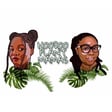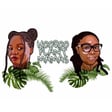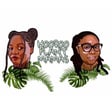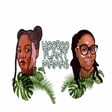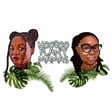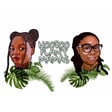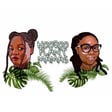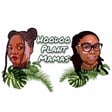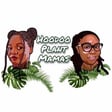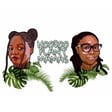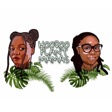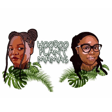Become a Creator today!Start creating today - Share your story with the world!
Start for free
00:00:00
00:00:01

Ep 52: Black Speculative Fiction Month
Our mini season has come to a close. In this episode, we recognize Black Speculative Fiction Month and the contributions Black creatives have made to the speculative fiction genre. We get into how Black horror reflects our deepest fears and how sci-fi is both pessimistic and optimistic about Black futures.
Create your podcast today! #madeonzencastr
RESOURCES
- "The Argument of 'Afropessimism': Frank B. Wilderson III sketches a map of the world in which Black people are everywhere integral but always excluded" by Vinson Cunningham. July 13, 2020.
Books
- Apocalypse Still by Leah Nicole Whitcomb
- The Wishing Pool and Other Stories by Tananarive Due
- Let the Dead Bury Their Dead: And Other Stories by Randall Kenan
- Let's Play White by Chesya Burke
- The Black Girl Survives in this One: Horror Stories Edited by Desiree S. Evans and Saraciea J. Fennel
- The Sound of Stars by Alechia Dow
- The Kindred by Alechia Dow
- Song of Salvation by Alechia Dow
- "You Will Know Your Tribe by Their Joy" by Julia Mallory
Movies/TV
- Are You Afraid of the Dark? Amazon Prime
- Candyman [1992] Peacock
- Bones [2001] Tubi
- The Skeleton Key Tubi
- Sugar Hill [1974] Tubi
- Abby Plex
- Scream, Blacula, Scream Tubi
- Mr. Crocket Hulu
- Bite Sized Halloween Hulu
- The Blackening Starz
- Cuties Netflix
- They Cloned Tyrone Netflix
- "Space Traders" - Derrick Bell (1994) YouTube
This podcast was created, hosted, and produced by Dani & Leah.
Our music was created by Ghrey, and our artwork was designed by Bianca.
Transcript
Season Finale Introduction
00:00:00
Speaker
Who do plant mamas? Get your
00:00:45
Speaker
Hey, y'all. Welcome back to our season finale. it's ah It's a short season, but we'll be back before you know it. Before we get into the show, let's do a quick check-in.
Personal Reflections: Fragility and Gratitude
00:00:58
Speaker
Leah, how are you today? So I saw this post where this person talked about how they were feeling fragile and delicate.
00:01:09
Speaker
And they were like, you know, I am okay, but I'm held together barely. And I was like, I think that's a good way to put it. Besides making it, I think, I think fragile. I'm i'm fragile, but otherwise put together, if that makes sense.
00:01:27
Speaker
How are you doing? That makes a lot of sense. I feel like I'm probably in the same boat. I just feel like I'm losing my mind and we're being gaslit by everybody who is, has any kind of faith in the election or these politicians, but You know, doing my best. That's all you can do at this point. What are you grateful for today? Last week was really like emotionally rough for me. And this week I feel okay. Like I feel better. And this morning I made myself take a rest day. i'm
00:02:07
Speaker
really trying to do better about listening to my body and I decided to listen to my body today. So I did a short yoga session because I was sore and I think that was good for me. So I'm really thankful for that and I'm thankful for my body for the ways that she continues to communicate with me and demand that I show up better.
Seasonal Excitement and New Beginnings
00:02:32
Speaker
What about you? It is getting cool. Finally, I'm going to have my first fall in like eight years. So I am very grateful. I'm very excited for that. I'm excited for cool weather for the first time in a very long time.
00:02:49
Speaker
Oh yeah, I don't know why some Florida had all the seasons. I mean, north I was in South Florida, so it was like 70 to 90 degrees year round. Rarely did it go above like 94, and then rarely did it go below
Black Speculative Fiction Month
00:03:06
Speaker
70. In the past few years, it's gotten colder, but It's mainly 70 to 90 degrees for 90% of the year. oh okay So we talked about how October is Hoodoo Heritage Month, but it is also Black Speculative Fiction Month, Gullah Geechee Heritage Month,
00:03:25
Speaker
and Creole Heritage Month and I feel like there's a lot of overlap between these months but speculative fiction is what we're going to talk about today and it is the umbrella term for fantasy, sci-fi, and horror and Black Speculative Fiction Month is supposed to celebrate Black authors and the work that they do.
Childhood Horror Exposure
00:03:44
Speaker
So let's talk about it. For me personally, I've always been drawn to like mystery, magic, and horror.
00:03:51
Speaker
And you know from growing up, like we didn't really have access to a lot of speculative horror. like I just don't remember it being a thing as far as reading. So you know I loved reading Goosebumps. I watched the series. There was a series. And I really loved Are You Afraid of the Dark when Nickelodeon My earliest memory of watching horror movies is probably Candyman. I was very young when I first saw that movie and it scared the shit out of me. The significance for me of Candyman was that it was set in Chicago, the first one, and and I was living in Chicago at the time because I was very young.
00:04:32
Speaker
And also my great grandfather lived around the corner from Cabrini Green. Cabrini Green is the projects that are in that, like where they are in the projects, that Candyman is hunting. That's what that is. So every time we would go by, my dad would be like, oh, look there goes Cabrini Green. That's where Candyman be at.
00:04:53
Speaker
So that was very significant to my childhood. I was very afraid of Candyman. And Loki, you would never hear me say his name. I already done said it too many times and now. And then, of course, the Bones, which you're going to talk about in a little bit, that featured Snoop Dogg. But we all know the real star of that movie was Snoop Dogg's Silk Press. And there's some other core writers and books I did want to mention that we can hopefully put in the show notes.
Writing Horror: Redemption vs. Tragedy
00:05:22
Speaker
Tarana Reeve-Dew, I love her work. The last book I read by her, I don't remember the title, but I also read The Wishing Pool, which is I think the most recent book she's put out. Randall Keenan is like Southern Gothic. And then there's Let's Play White by Chesia Burke, who I think writes other sort of but black speculative stories. So one of the books I put down for Randall Keenan was let the dead bear their dead. And then the most recent horror that I read and loved, aside from Leah's book, which I don't know if you consider it horror, but some of them is pretty. It gives horror. But anyway, The Black Girl, The Black Girl survives in this one, which is edited by Desiree Evans and Sericia Fennell.
00:06:12
Speaker
As far as writing, I'm sad to say that i as much as I love horror, I've never written it. I feel like I've attempted it, but it ends up being more speculative magical realism or something. But that's something I hope to accomplish in the near future.
00:06:30
Speaker
I do have some stories I've started that have potential to be horror but I'm still working out the kinks and obviously I've said multiple times probably this season that I have not been writing outside of work so you know I'm hoping to change that towards the end of the year beginning of the year. I mean honestly don't feel bad I think I've written one thing this entire year. Yes, October, and I've written one short story. I've talked about this on the podcast, but I got into horror writing for my nightmares and trying to create an ending that was redemptive. And so reading and writing horror doesn't terrify me in the same way watching horror does. And I used to be really scared of all things horror, even goosebumps. Like I did not read that as a child. It was too scary for me.
00:07:21
Speaker
I think the scariest thing I saw was
Hoodoo and African Spirituality in Film
00:07:24
Speaker
like Chucky. That was probably it and that was a little too much for me. I saw Chucky too very un-series, horror fans.
00:07:35
Speaker
extremely serious. Yeah, I mean, now as an adult, I can see that but as a child, the idea of one of my dolls coming to life and killing me that was terrifying. But I can see like now, as an adult and as a writer, like how genre fiction has happy endings and what makes it compelling to read and to watch this really uncomfortable stuff. Because one, we know that it's going to work out in the end. And two, it's like,
00:08:03
Speaker
Exaggerating our worst fears and kind of getting us through it. So it's kind of therapeutic in a way That's what I hated about Queen and Slim like we had to go through all this terrifying traumatizing shit for a traumatizing ending and for me it wasn't worth it and so when I write horror I try to keep those genre conventions in mind and I try to have an ending that I feel is worth the horror that I'm asking the reader to go through and And that can be really tricky and I don't always get it right. And I think like you, I feel like a lot more of my writing falls under magical realism, which is a genre with like magical elements, social commentary and real world settings. And that's my home because I feel like living
00:08:49
Speaker
as a neurodivergent person who experiences the world differently, not just my perception of the world, but like my senses. I have a different sensory experience. And then when I tell people about it, they think I'm lying or something must be wrong with me. And that's where a lot of the pathological language comes from. But like the way that I experience the world is a fantasy to most people. So it's not that hard for me to write these fantastical stories as it is for other people, because I'm already living a quote unquote like fantasy.
00:09:19
Speaker
No, that makes a lot of sense. The other thing we really wanted to get into was like, Hoodoo and African spiritual traditions that show up in move in, particularly in horror movies. The first movie I saw depicting Hoodoo was The Skeleton Key.
00:09:38
Speaker
I used to love that movie until I reflected on it more, grew up and also grew into my own practice because I saw this movie before I was like actively into Who Do. White people took up way too much screen time in that movie and like even the way they set it up was kind of fucked up. The premise of it was amazing. It's basically about these two um enslaved people, I think they were the enslaved or like working as like, I think they were enslaved and they did some kind of ritual where they body, they switched bodies with the, with their masters children.
00:10:20
Speaker
And then they continue to like do that in order to like stay alive. So obviously their physical bodies and the children in those bodies that they swapped bodies with ended up getting hung because they caught them doing the ritual with the children. But by then they had already gotten into the children's bodies.
00:10:37
Speaker
So fast forward because these people have basically just been living on one for generations through different bodies. The bodies that they take are white. So you have this white woman as the main character and then you have the two who, the two, the two characters who are allegedly black on the inside. And it's the whole thing. I don't want to get too deeply into it, but it's annoying because I'm like, there was an opportunity to have black people lead in this movie. And even though the premise is really great, like this is, I'm sorry, switching bodies and getting yourself free, even if it's through the kids, but you know how them people probably, even though kids are oppressed,
00:11:23
Speaker
Them kids get treated better than enslaved person. And they allowed to disrespect enslaved people because they didn't see enslaved people as human. So that that's one of the depictions. And of course, black people are not truly at the center as far as like visually. We're just kind of like a background thing. And
Black Spirituality and Revenge in Horror Films
00:11:44
Speaker
then there was the movie called Spell that we may have mentioned on a another season.
00:11:50
Speaker
that came out in 2020 I didn't even watch that the trailer was enough for me to see that like this was a movie demonizing hoodoo and making it seem like it's evil because the little bit that I was able to read about the premise like didn't even make sense there was no reason for this to happen other than like whatever agenda to make it seem like Black spiritual traditions are demonic and evil. And then, of course, some more positive representations are Eve's Bayou. I feel like Eve Bayou was a really positive representation around that and around Black people in the South and just
00:12:32
Speaker
the way we do spirituality and religion. So other films that have that include like African spiritual traditions and a play on it, even though they can be problematic are black exploitation horror films. Movies like Sugarheel, which Leah is going to talk about in a little bit in in more detail. Abby, which is basically the Black version of the Exorcist. So Abby is like this church-going Christian girl who's allegedly possessed by S.U.
00:13:05
Speaker
And a part of her possession is that she's very like overly sexual and just like vulgar and all of that. And she's exercised by an Ephai priest. So there's a whole thing. And then Scream Blackula Scream, which features Pam Grier. In that movie, Pam Grier plays a voodoo priestess who's approached by Blackula because he wants her to save his fermented soul. So if you've seen Blackula, Blackula was cursed.
00:13:35
Speaker
by Dracula. That's how he became what he is. And he does not like it, even though he spent his time torturing other people, which you just got to go watch it to see. But it's actually funny. Beyonce's ex stepdaddy is also in it.
00:13:52
Speaker
showing his ass, but he is in it. As you were talking about where you first saw like kudu in African spirituality, I had to think about where I saw it and I'm not sure, but I do remember a few years ago, there was this a movie called Cuties on Netflix.
00:14:11
Speaker
and it's about this teenage girl she wants to join a dance team and so she's doing you know these dances and stuff and it can be interpreted as like her like signing up to be sexualized so they come from a very religious family it's a muslim family her mom is african but they live in the uk or do they live in france they live in europe somewhere her mom is african but they live in europe and Her mom is worried that she has been possessed by someone. So she has like a woman in white cum and chant and throw water at this little girl to try to exercise her. And so that movie had a lot of scrutiny when it came out. That scene in particular, there were a lot of white people who were saying that it was a wet t-shirt thing for pedophiles, even though it was very, it was clear to me, you know, that this was an exorcism that was being performed. But that was a recent time that I remember
00:15:10
Speaker
any time of African ah spirituality coming up. So for this episode, we watched Bones, which was a 2001 movie, The Snoop Dogg and His Silk Press, as you said, with ah Pam Grier, Bianca Lawson, and Khalil Kane from Girlfriends. And so that movie is about this haunted building that's guarded by a hound dog or bloodhound.
00:15:33
Speaker
And this guy buys this abandoned building. He plans to restore it and make it a nightclub. And come to find out, his dad was part of this plot to sign over um that building. And so the main businessman is Jimmy Bones, who was played by Snoop Dogg. So he was Jimmy Bones' friend. He was trying to convince him to sell crack on the streets. That's what it was. He was trying to convince him to sell crack on the streets. With a crooked cop, a crooked cop was also involved in this. It's important to know. That's true. And the cop was white. So he was trying to get him to sell crack. And he ended up being part of killing him. And so Bones comes back from the dead and he takes out all of these people that were part of killing him. And in that movie, his love interest, Pam Grier,
00:16:23
Speaker
is a spiritual lady. i don I'm not sure they said what tradition she practiced, but she does tarot and she does seances and you know stuff like that. And she's um psychic too. Yeah. So she like accurately forecasted that Bones was going to be set up and she tried to warn him, but he didn't listen. And then we watched Sugar Hill, which I thought was very similar. It had a black businessman who wouldn't sell to white people. And so they murdered him. And then his fiancee hired Baron Sandy, who is a Haitian deity.
00:16:55
Speaker
to take out all of these ah men and in both cases what was interesting was like there was this white man who wanted what a black man had partnered with a black man to try to get it from him and then like black spirituality was used to settle the score and kind of take these white men out and it was like that was the only avenue that black people had to get justice.
00:17:17
Speaker
I love the idea of Black people getting they licked back, period. You know, the way they depicted it in the 70s, this is when I always tell people about Black exploitation or Black exploitation films, whether it's horror or otherwise. You can't watch it with your woke eye. You can't. You cannot bring a 2024 lens to these movies.
00:17:41
Speaker
What you can do is have in mind the context of the time while also being open to the ways that they were being kind of, uh, what's the word for it? Like when somebody's doing something new and I don't want to say groundbreaking feels too big of a word, but what they're doing in these movies, like.
00:18:06
Speaker
There's something there, there's something important there to really think about when it when it comes to black culture, when it comes to black pe black communities, particularly with Bones. That scene, I actually ended up fast forwarding through them killing him. um It was so heartbreaking.
00:18:23
Speaker
because you know shit like that probably did happen. He was beloved in his community and the fact that two black men and a crooked cop with a white crooked cop set him up and really wanted him to take that into his community and he refused It was just fucked up. Like it's a horror movie, but there's always something there. There's always something to think about there. And so I loved him coming back and fucking up everybody. This is what I want for everybody.
00:18:56
Speaker
I want that for all of us to be honest. So we also watch Mr. Crockett. And when I saw the trailer a few weeks ago, I was like, this looks so familiar. And then I remembered that it was part of the bite size Halloween mini-series on Hulu, and I found out that Hulu optioned it to make it from that short to movie. And so the movie opens with this little boy watching this television program with a black man and kids and dolls. It's very PBS. And then his stepdad tells him, turn it off, eat his food. The boy doesn't want to.
00:19:32
Speaker
and the stepdad tries to force-feed him and then on the TV screen you see Mr. Crockett look toward the dining room table and then he slowly sinks down the screen and then he walks out of the VHS and so he proceeds to force-feed the stepfather and treat the stepfather the way that he treated the kid and so what I love about horror is that it's often a reflection of what we're afraid of as a society And Black Horror is about what we're afraid of as Black people. And so this was very blunt about Black people and parenting and the fear that Black parents take out on their children by beating them, which is why Mr. Crockett does to parents what they do to their children. And I think a reckoning is like currently happening right now in terms of Black parenting. Spanking, as many of us know, irreparably harms your children.
00:20:24
Speaker
It is a legacy passed on from slavery. And if you as a black parent want to move away from that, you're considered a bad parent or your kids are going to be the worst kids in existence because you're not keeping them in check. When a lot of times people just hate kids, you know, kids make noises, they make messes, they have big emotions, they just got here and and you can't expect them to do all of these things that they don't know how to do if you never told them and that you yourself can't do like those things don't make sense.
Black Trauma in Horror and Jordan Peele's Influence
00:20:55
Speaker
So before I keep going, Danny, what were your thoughts when watching this movie? This movie was insane. It was ridiculous. And I don't mean that in particularly a bad way because I did like the premise. I thought
00:21:11
Speaker
some parts were just like a little too gory. I had a lot of beef with the pacing. Like we coming in and strong and like we get in gore, we get in stuff pulled out of intestines and shit within like five minutes.
00:21:28
Speaker
barely. So it was a little cartoonish in that respect. Like it was just like, what is happening? But to your point, this idea of like making parents pay for harming their children and then taking them away to a place where they don't have to worry about that.
00:21:44
Speaker
This is part of my beef with the premise and I know we're not like, I'm not a film critic or whatever but I be thinking about this stuff because like you said earlier about how black horror functions or can function. And I know not everybody wants to be Jordan Peele, but I think there was a really important opportunity here to like just get more creative.
00:22:05
Speaker
because Mr. Crockett was a victim but then he like turns evil and then you have like these one of the kids who's a main character he's just like out of control in mind you he could be grieving but I don't know it almost it feels weird the way it was set up because I feel like there was an opportunity for Mr. Crockett to heal and release the children willingly. And and some people might say that's cheesy. And don't get me wrong, I love a plot twist at the end of a horror film where there's no resolution like, love it. But here, there's st you seem to be trying to make some kind of commentary. So like, why not take it a step further and be and be more meaningful? How do we get to the core of what's
00:22:57
Speaker
what turned Mr. Crockett this way because for him to go through what he went through and then him the then get painted as just like evil when the way he died was even like noble, I don't know. It it gives a lot of mixed messaging.
00:23:13
Speaker
in a particular way that I don't really know what to do with, especially with the mom who didn't really do anything. She lost her temper because this little boy was acting a fool. Like he was so disrespectful. And I want to ask the director, why are you trying to insinuate something with this when making this little boy act like this? I just don't think most kids are acting this extreme in grief. So it's a movie, but you know, I'm just saying.
00:23:42
Speaker
you know, there was an opportunity missed. But the premise of it I thought was really interesting. And I love that black women were in the lead and they were the final girls. Okay, we love a a black final girl. I'm gonna say I do agree with you.
00:23:59
Speaker
I felt the same way with ah They Clone Tyrone, where when the evil people are like, this is why I did everything. I'm like, maybe we could have kept that to ourselves. Like, I would have been better off not knowing. I did enjoy his backstory of him, like, he was abused as a child. And so he's trying to help kids who are being abused. And even like you said, the way that he died was kind of traumatic. I wasn't expecting, I was expecting him to be more violent towards the kids.
00:24:29
Speaker
in order to justify the violence he had like as a spirit. But yeah, there were some things I was like, we could have kept this to ourselves because I think the movie would have been better if they did. I like that you brought up they clone Tyrone because I actually really liked that movie. But yeah, that part two was a lazy moment for me as far as the writing because let's be fucking serious.
00:24:51
Speaker
like you could have came up with something better a better excuse because that excuse was silly and selfish because your brother wasn't his brother that got killed by the police you think this is the answer that don't even make no sense and honestly you really insulting the intelligence of this black man for real by making that be the reason but Other than that, it was a good movie and I agree with you. If that's all you could have came up with, you could have kept that shit and just let him be a black man that wanted power. And so he decided to go against other black people. Before we go to break, I do want to talk about Jordan Peele because I feel like he's always talked about when we talk about black horror.
Conspiracy Theories and Horror
00:25:37
Speaker
And after Get Out, there was like a whole slew of Get Out-esque movies.
00:25:44
Speaker
And I feel like a lot of people misinterpreted get out success. What made it successful was that it pointed to a particular fear that black people, especially black people in interracial relationships and or in white spaces feel and And the horror of that was like the whitewashing of the Black self. And I'm also glad that Jordan Peele didn't stick with that and instead was thinking more about individual horrors to scare people and really all people when he did us and did nope.
00:26:16
Speaker
I'm glad he didn't stick with that, but apparently Hollywood was like, is we're going to keep making these kinds of movies and they're all not great. So I think another good horror movie is actually a horror comedy. It's The Blackening. It was hilarious. I saw it last year. and But a lot of that was also around the fear that black people have around not being black enough or not performing blackness in a way that makes other black people accept you. So I think that's what made it really successful.
00:26:45
Speaker
The Jordan Peele effect has been interesting because a lot of people don't have the range. I would name a certain person but I'm not, but a lot of people do not have the range. You know I can see how like the ways other people might have connected to Get Out. Get Out was a decent movie. It was one of those moves where I was like this was good but I never want to see it again. Like I'm not interested in experiencing this Again, but yeah, I think you're right. A lot of people have tried to do what he did and I feel like the closest most effective one that has come from this is they clone Tyrone in my opinion like yes, this big conspiracy, but it's very relatable.
00:27:33
Speaker
is black people all across this country that believes all of that. And there may be a little so bit of truth to some of it. So I thought it was really creative to really put that fear of like these motherfuckers is putting some in the chicken. and And to be real, let's talk about the chicken sandwich.
00:27:55
Speaker
and but We know that, honestly, it feels like that didn't even happen. if That feels like that was some kind of fucking movie because they was acting a fool. And shortly after that, what happened? The pandemic. That's all I'm saying. like So points were made and it is what it is. but But yeah, I'm glad you brought that up.
00:28:23
Speaker
You know what, since the Diddy thing, I'm like, the Illuminati girls were right. To some extent, you they were right. What sets me about those people who I used to be a part of as far as looking at all those videos on YouTube is that it always takes a left turn. Like they always end up being bigots. I always got to have a line with them.
00:28:46
Speaker
When I say they were right, I mean, they were right in that whole, like, something's going on in the music industry and people are abusing their power to get certain people hit, things like that. But I was suspicious because it was always like, oh, black, no black woman in the music industry got to where she was of her own talent or whatever. It was always the black women.
00:29:10
Speaker
made a deal with the devil and it was a bit exaggerated but like y'all were right about the music industry and some shady stuff and some violence. Yeah they saying Clive Davis the puppet master. They saying he behind all of it.
00:29:27
Speaker
I wouldn't be surprised if Trump was really at the top, to be honest. like he He's all up in that ditty shit. He got photos, all of this shit. so I don't know. I already have the theory that they be having the billionaires in the entire world like who make up the world. They got secret conventions that they have, that they come up with like bullet points to present to politicians.
00:29:53
Speaker
and do bids. What do you call it when they when people bid on something? like I think they do something. Like an auction? Yeah. I think they do some shit like that. so Oprah up in there too. Beyonce and Jay-Z doing probably there.
00:30:08
Speaker
We gotta be realistic about this, okay? So they onto something, because there's definitely some shit going on. There's definitely some meetings happening. Now the girls are saying that there's an underground world that the celebrities are running. And see, when we get to that point, I don't know. Is it possible? Perhaps. But you know, at some point you started taking a step too far. Yeah.
00:30:36
Speaker
So we can go to break. Alrighty.
00:30:47
Speaker
Let's get into the ways you can support the Hoodoo Plant Mamas. One is through our bookshop where you can buy the books that we've previously discussed with our Writing the Spirit guests. We have a Hoodoo's Beginners Guide as well as our top reading picks. You can also buy my books. Every purchase you make helps support our show. Check us out at Bookshop dot.org slash shop slash Hoodoo Plant Mamas or the link in our show notes.
00:31:09
Speaker
Other ways you can support us include rating and reviewing this podcast on Spotify and Apple Podcasts. Follow us on Twitter at HoodooPlants and Instagram at HoodooPlantMamas. Check out our Patreon where we share exclusive video, plant, and spiritual content for only $3 a month. We also have a new Patreon. Hi Rochelle, thank you so much for supporting us. If you prefer a one-time donation, you can donate via Cash App at Money Sign, HoodooPlantMamas, or on our paypal at who do plant mamas at gmail dot.com. All right, let's get back to the show.
Afro-pessimism and Black Sci-Fi
00:31:51
Speaker
So for the second part of this, we wanted to talk about how sci fi, which is part of that speculative fiction umbrella, how black sci fi can be used to imagine better worlds. So one thing that came to mind for me was Afro pessimism. And I was really interested in the role that it may or may not play in black sci fi.
00:32:12
Speaker
Let me first say I do not fully understand this school of thought and I think that it's really heady and hard to follow even when you try to read about it. It's just really hard to understand. I found like two kind of sort of definitions, excerpts that may give a little insight. So one of them is from a 2018 Oxford bibliography entry via Wikipedia.
00:32:40
Speaker
And it says, Afro pessimism can be understood as a lens of interpretation that accounts for civil society's dependence on anti-black violence, a regime of violence that positions black people as internal enemies of civil society. Now, someone did a review of one of the founders of this school of thought, a review on his book. I think the book is titled Afro pessimism and ah Some sentences I pulled were the following. For Wilderson, that's the guy's last name, the state of slavery for black people is permanent. Every black person is always a slave and therefore a perpetual corpse buried beneath the world and stinking it up. It's really dramatic. Blackness is coterminous with slaveness wilderness rights.
00:33:38
Speaker
So that word I looked up, I think it can be translated to blackness is synonymous with slave-ness, but that's what I mean by like unnecessarily like heady and convoluted. In civil society as we know it requires this category of none person to exist. Emancipation is a myth. Now that's very dark. I'm sorry if there's some Afro pessimist experts that listen to this. I'm doing my best, but an example of a person that I think falls under this umbrella is Derek Bell, particularly his film and I think it's also a short story, Space Traders. If you don't know what Space Traders is, a short synopsis is basically some kind of extraterrestrial something from outer space basically comes and says, hey, we'll basically cure the world of all its problems if y'all trade
00:34:35
Speaker
Black people. Really, they said people with a certain amount of melanin, I think. So it don't just include black people, but for the purposes of this film, it's focusing on black people. And there's a whole thing with them trying to figure out like, are we gonna really do it? You got the black church in there talking about it, people just trying to figure out like, what's going on? And you have a black man who's a part of this like conservative group that is trying, that is a part of the negotiation who,
00:35:09
Speaker
thinks he's going to be safe. Ultimately he isn't. That was interesting within itself to think that he was somehow going to be an exception. And so I was thinking about, you know, this is sci-fi. This is a type of sci-fi. What could this film or even the short story teach us? What could this dystopian plot, particularly for Black people, what is it doing? Can it inspire action? I feel like That particular plot of black people getting traded for the world to be perfect is unbelievable for a lot
Afrofuturism and Black Narrative Futures
00:35:45
Speaker
of people. But then you read somebody like Octavia Butler and to me it's way more terrifying what she's doing because it feels more realistic in a way that we can we can see and we can see remnants of it in our current society
00:36:01
Speaker
And maybe the difference is Butler tries to offer hope. I don't know. Let me know what you're thinking. I think the core of Afro pessimism is like, trying to be realistic about anti blackness. And I think when it's in sci fi,
00:36:18
Speaker
is trying to be realistic of the fact that like a lot of the way that our society structures is on the backs of Black people. And it's like, what would a future look like knowing how a lot of these people will fight to their death to keep Black people subjugated? What will the future look like then? And so I'm thinking that like a lot of this could be a mix of Afro-pessimism and Afro-futurism.
00:36:43
Speaker
Afrofuturism is incorporating futuristic or science fiction themes with elements of Black history and culture. So I recently finished Alicia Dow's saga. I believe she's biracial, but her saga is an interconnected, not quite chronological,
00:37:01
Speaker
Books set within the same universe is The Sound of Stars, The Kindred, and The Song of Salvation. All of the characters feature a black fat teenage girl. But in this future, there's still colonization. It's an intergalactic colonization. Black people are still subjugated. Like there was ah the main girl in The Kindred. She came from a different solar system and then their spaceship landed in Florida.
00:37:26
Speaker
But like there was a Black woman in Florida who could do her hair, but there wasn't anybody on her home planet that knew how to do her hair. And I was like, i just that that didn't feel realistic to me in the same universe where like there's a med kit that can scan your body, see what's wrong with you, and fix it like immediately. like It doesn't make sense to me that you can have that technology, but you can't do a Black woman's hair. like that was I don't know. But what I really loved about this saga was that music, art, and love are all central to the liberation of these subjugated people. And I think Alicia Dow is really great at writing big feelings. So if you hate things that have a lot of feelings in it, you may not like these books. But I did find her critiques on colonization very brilliant. That makes sense about the being realistic part. I found that some people that talk about like people who I've
00:38:21
Speaker
seeing casually talking about Afro pessimism. Talk about it in a way as if there it doesn't offer hope. But I think that you can find hope in it when you really understand what you're dealing with because as dark as Derrick Bell or even a Octavia Butler's work can be. Even this idea in the book that you talked about of like not having technology to do black hair, I still feel like it can sort of pull people into like the reality of where we are. like You really have to be willing to sit with where we are or where we could be. Do you believe that the United States government would trade black people for world peace? Yes. Yes, they would. Because y'all are willing to sacrifice Palestinians
00:39:14
Speaker
and there and and literally the need for a ceasefire in the name of your hypothetical rights that you think Trump is gonna take. If you allow it to them, you allow it to yourself and a lot of people don't believe that shit. So I don't know, a part of me feels like it can teach us something and it can bring people to so reality because a lot of niggas simply aren't living in reality. And maybe that can be the, maybe that in part is the also the function of sci-fi in a lot of ways where Yes, this is ridiculous, but let's dig a little deeper. Well, not ridiculous, but maybe this seems like it could have happened. But let's think about, you know, let's dig a little deeper and see like maybe something simpler could, or maybe we already see something like this.
00:39:58
Speaker
happening? I think sci-fi can also operate in showing us other ways kind of like maybe in the future we are still dealing with colonization but we can use technology to get us through it right and so I'm thinking of Julia Mallory's you will know your tribe by their joy and it was a future where in the past you know slavery had happened because now black people got reparations And laughter is causing black people to levitate and I'm thinking about people have made so many videos about this about how like black people don't laugh in place like like our laughter has movement with it. So I think when we write about the future. Yes, we can be realistic. Yes, we can acknowledge that like.
00:40:44
Speaker
some form of our subjugation may still exist, but we can also hope that it won't always
Black Joy in Speculative Fiction
00:40:51
Speaker
last. like we can also I don't think it hurts for us to be hopeful and to imagine our joy and our laughter in the future. I don't think that hurts. I agree, and that flash piece by Julia, you will know your tribe by their joy is so imaginative. And I don't know, reading it just makes you feel this sort of warmness because It almost represents what we're doing now where, yeah, we're not physically in chain like chains like our ancestors.
00:41:22
Speaker
but we're still struggling through these particular things. But look at the ways we allow our joy to physically move us, to you know its give us hope, to help us like form community. Literally happiness, laughter, dance, joy, all of that is what really brings Black people together. When Black people are gathered, it's a party. It's a party, period.
00:41:48
Speaker
So I really love that and I think you're right, it doesn't hurt to be optimistic. And I think for me, I'm gonna be honest, like I think I personally struggle with optimism when we're forced to suffer through and even be accosted by people who are like choosing to be a delusional in a way that like is harmful to the rest of us.
00:42:15
Speaker
in a way where they are truly not thinking about the solidarity we should be having with not only like humans on this earth, but all living things. The solidarity we should have with the earth that holds us. So yeah, I think that's the struggle I have in that and that's partly why I brought up Afro pessimism in this discussion. But I do think that joy and hope are important. Joy and hope are necessary. And I think like this story Julia wrote, I think stories depicting black people as happy are necessary. And it kind of goes back to something I've said several times about how I do not like movies or stories that are heavy handed with black trauma.
00:43:03
Speaker
especially when it's like related to slavery because I do believe that my enslaved ancestors, the ones who died enslaved, I believe they had moments of happiness. I believe they had moments of community where they could come together and exhale even if just for a few minutes.
00:43:24
Speaker
even in the midst of that terror and to constantly like hyper focus on what we know the the bad stuff I think it humanizes them in it and a lot of way that it elevates them as ancestors to to honor that like that they were so much more than their subjugation and yeah and I think this story does a good job of that like just like that power and that laughter and in that joy.
Season Wrap-up and Future Plans
00:43:56
Speaker
I'm going to say yes, I agree. So my final thoughts is I love what speculative fiction can do, not just for like black people, but for the black imagination and how we
00:44:10
Speaker
as writers have used it to try to to try to get through a lot of the violences and a lot of the destruction that's going on. So Alicia Dow's books I've been reading and it was just like, it was a comfort to me to think about a universe where all of this technology, because I really wanted something like that Medicaid to scan my body and fix me.
00:44:36
Speaker
I wanted that real bad, but it was just like, it was just such a comfort to think about like, wow, somewhere in this universe, something like this could exist because we're imagining that it can exist. So if we can imagine it, I believe it can be one day. Yeah. I think, I think it functions that way for me for sure. And I think that's one of the ways I stay hopeful. I really love this conversation.
00:45:00
Speaker
I think this was a good short season and I am forever grateful for the people that continue to support us because this is really a labor of love, especially given what we're currently living through. This is like.
00:45:17
Speaker
a highlight in my life right now. So I'm thankful to have been able to do this with Leah for another year and another season. This is our fourth year. Period. So yeah we've we've done this under interesting circumstances all over the course of those four years. So you're welcome.
00:45:41
Speaker
if If you like this episode, you can like, rate, and review Who Do Plant Mamas on Spotify and Apple Podcasts. If anything from the show resonated with you, make sure to share it with us on social media. You can find us on Twitter at WhoDoPlants and Instagram at WhoDoPlantMamas. Please stay in touch even as we go on our little hiatus. And thank y'all for listening. Bye.
